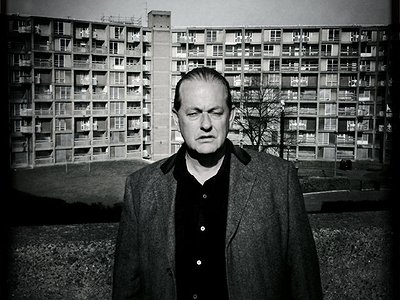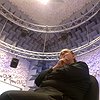To the end...
To most people, Martyn Ware's name conjures a time of neon, electro, raves and the boldness of youth. But today, Ware's name represents a legacy that reaches far beyond pop music. Founder, performer and producer of Human League, Heaven 17 and BEF, producer of hits for Tina Turner, Chaka Kahn, Erasure, and all round electro powerhouse, Ware is always looking forward. These days Ware is occupied with 3D sound and vision installations through his company Illustrious. With business partner Vince Clarke, Ware has created a vast array of projects for The Science Museum, The Royal Ballet, Amnesty International, the V&A Museum, Mute Records, BBC TV, BAFTA, Museum Of London and Tate Britain. Using unique 3D technologies, Ware can achieve unprecedented feats of immersive sonic and visual splendour, exploring abstract and commercial ideas alike. When he's not championing the rights of the musician in these tenuous times, Ware can be found supporting the arts through his non-profit series Future of Sound, acting as visiting professor at the University of London, guest lecturing at various institutions and immersing himself in music and arts-related activities. A wealth of inspiration, tireless effort and generosity, Martyn Ware looks set to leave his mark firmly not only in the annals of music history but on the music of tomorrow as well.
What was your first recording-related job - and what or who were your early passions and influences?
In the early Human League we learnt to record everything we did as an integrated part of our methodology – and my early influences were soundtrack producers and composers like Pino Donaggio, Nino Rota, Morricone, Goblin, Elmer Bernstein, Leonard Bernstein and the daring recording techniques used by people like Brian Wilson and Phil Spector.
What do you personally consider to be the incisive moments in your artistic work and/or career in the field of recording?
The recording of Let Me Go and Tina Turner’s Let’s Stay Together, plus the innovative use of early synths on the Human League recordings. Let Me Go was the peak of our song-writing and recording practice. It bought together all of the expertise we'd gathered from the first few years of The Human League and designing sound through electronic means; together with the expertise we picked up from our producers Peter and Greg Walsh about vocal production and multi-layered, multi-track vocal techniques.
Working with the new technologies of the time, Let Me Go was one of the first commercially available tracks to feature the TB3 Rolling Base Line, which of course, went on to become a classic piece of kit for acid house etc. It was also amongst one of the first tracks that we used a large scale orchestra on which was an enormous pleasure and benefit. The idea of combining all these techniques and knowledge bases into one entity was kind of what made Let Me Go and songs like Temptation the hits they were. We'd reached the peak of our creative abilities but were still young and fresh enough to make it sound original.
Let's Stay Together, was a different thing, it was more like interpreting a voice that everyone inherently knew in a different environment. I've always been fascinated with electronic soul and pushing it forward. I saw it as quite innovative because it bought together electronic and traditional elements and that's always been what's turned us on.
How would you personally define your role in the creative process?
Producer/director/auteur...everything really. From the inception of the idea right through to manifesting it. Everything I've ever done in my career was done with the intention that I'd be there at the end of the process. If you work backwards from that expectation, when you record individual elements you understand the pieces of the jigsaw that only you can assemble at the end. That might sound obvious but it surprising how many people don't work that way, particularly in the US where it's quite segmented and put together by people who never even meet.
I like to control every element of the work flow to manage the quality and the signal path, defining and selecting which musicians you want to play on different things.
What is the scope and what are the limitations of what you are capable of doing?
There are no limitations apart from time, talent and persistence. In regards to technology, the line is becoming blurred between the technology of recording and the technology of creativity. In the past, you endeavoured to record everything as faithfully as possible but now you just expect that things will get transformed in the process by things like EQ, compression, filtering deliberate degradation, modulation etc. In essence, everything you put into a mix is now like an oscillator that you're putting through various filters and that's quite interesting. It makes everything much quicker, which is good because it's cheaper and you can get into that meditative work flow, but bad because you have less time for reflection. These days I actually have to schedule dedicated time into the recording process to stand back and reflect, get out of auto-pilot. It happens so fast that you have to stop and take stock sometimes.
In how far do you feel increasing technical education even among amateur musicians has changed this role?
It is much easier to create something that sounds good quickly, but this is a double-edged sword – the ease of creation dissuades the creator from innovation and rigour.
Nowadays record companies - what's left of them - have got tiny budgets for 95% of their roster. Even if you get a budget to do an album these days, which is quite an achievement today, there's not much in there for producers. Back in the day, I used to charge £5000 per track just for my participation, and that was typical. Then you've got recording costs, engineer costs, studio costs and the average cost-per-track was generally in the region of £10,000. Nowadays if you get a budget in the region of over £10,000 you're fairly lucky.
Unfortunately this means that experienced producers are not getting asked to participate. What they want now, all the record companies can afford now, are people who can be an engineer-programmer-producer in one. I'm not going to sit in a studio for months being a tape op and an engineer for a pitiful amount of money on the off-chance that it might make a lot of money at the back-end. This all happened around the year 2000, and it's why I branched out and started doing Illustrious. I could see it was more exciting and more profitable.
How do you see the relative importance of sound and composition?
I can't distinguish between the two personally, having emerged from a world where I learnt everything I know about composition from creating sound from individual oscillator that were placed through ADSRs and filters and pure electronic sound. I started from that view point and then began looking at the real world of sound and found-sound and started moulding electronic sound to match it. The integration of abstract sound with composition has been integral to the DNA of what I do.







